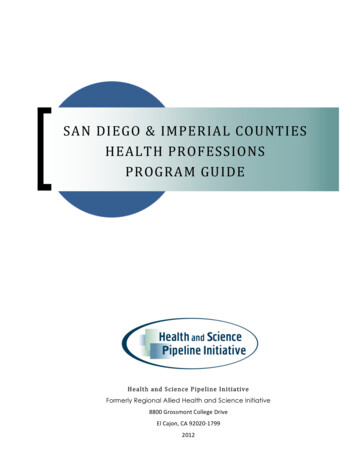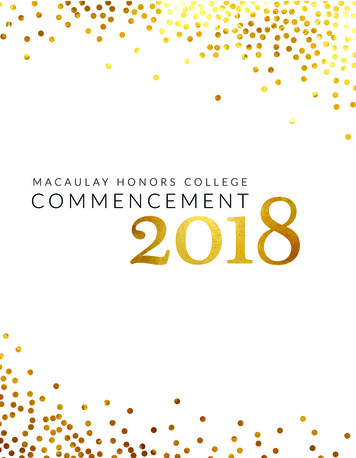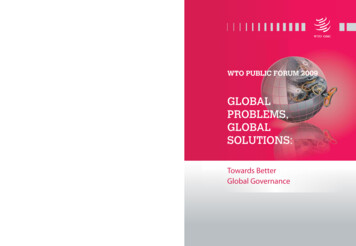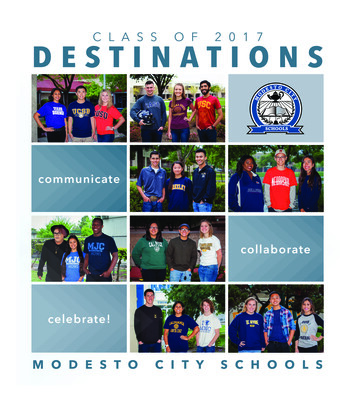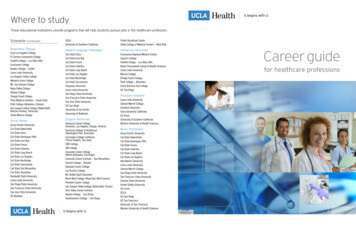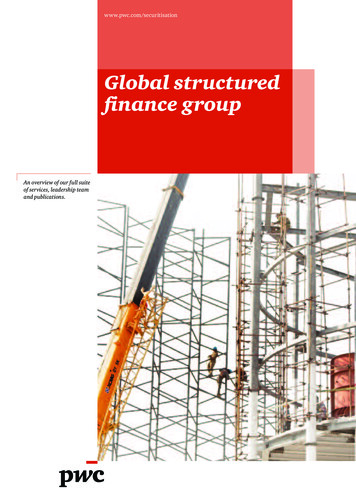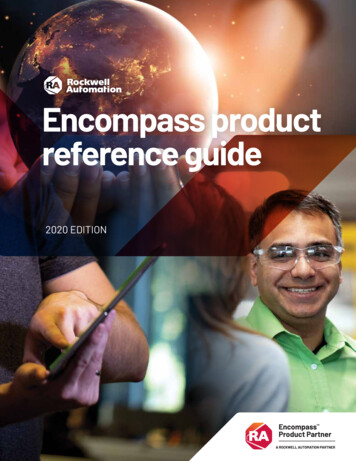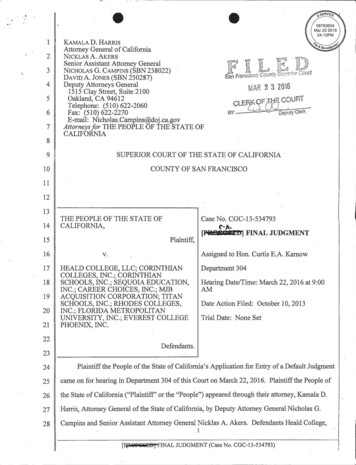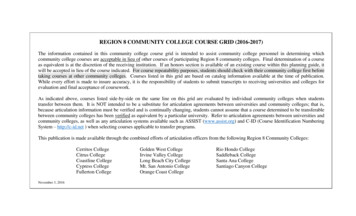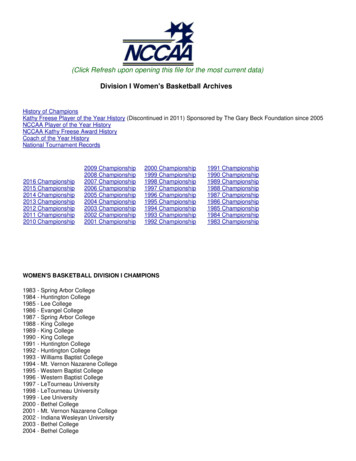
Transcription
NETWORK FOR ACADEMIC RENEWAL CONFERENCEGLOBAL LEARNING IN COLLEGE:Defining, Developing, and Assessing Institutional RoadmapsHyatt Regency Pier Sixty-six Fort Lauderdale, FloridaOctober 8-10, 2015Dear Colleagues,Welcome to Fort Lauderdale and AAC&U’s Network for Academic Renewal conference Global Learning in College:Defining, Developing, and Assessing Institutional Roadmaps. We are delighted to share this opportunity with you toarticulate a vision of global learners, global learning, and an array of practices to prepare students to thrive in ourincreasingly interconnected and global world. We encourage you to explore efforts to design educationalexperiences—across the curriculum and in the community—to interrogate the kinds of knowledge, skills, andperspectives that global learners need to demonstrate in practice.The conference program offers a variety of formats to examine the diverse approaches to and practices of globallearning—community-based learning, digital learning, global service learning, study abroad, and study away—thatoccur at home and abroad. As we seek to make global learning a reality for all of our students, it is essential that wecontinue to explore opportunities at home and abroad for intentional global learning. Sessions will exploreapproaches to global learning—from theory to practice—and provide a variety of curricular and co-curricular designs.Two-part workshops (a new feature in this year’s program) will provide time for you to deeply examine researchfindings and scholarship of critical topics in global learning and consider how to move from theory to evidence-basedpractices in your own work. The LEAP Challenge Forum will showcase students’ signature work with stories from boththe students and the faculty who mentored their intellectual initiatives. Collectively, these efforts will contribute tointentional global learning roadmaps to connect student learning experiences from the first year through the finalyear. We encourage you to take time to connect with colleagues for rich discussions throughout the conference andto continue networking beyond our time in Fort Lauderdale.At this important juncture, where global learning is becoming an integral part of the university mission, we mustensure these efforts are intentional, available to all students, and integrated across the undergraduatecurriculum. Thank you for joining with colleagues from across the nation as we continue our efforts to define,develop, and assess global learning to meaningfully prepare all students for the realities of the twenty-first century.Dawn WhiteheadSenior Director, Global Learning and Curricular ChangeKaren Ann KallaDirector, Network for Academic Renewal
SPONSORAAC&U thanks the sponsors below for their generous contributions. Conference sponsors are colleges, universities,associations, nonprofit organizations, and businesses that participate in the program and/or provide financial or in-kindsupport. Through their contributions, sponsors enhance the conference experience for everyone.The nonprofit Educational Testing Service (ETS) advances quality and equity ineducation for people worldwide by creating high-quality assessments basedTMon rigorous research. ETS is proud to introduce the HEIghten OutcomesAssessments, a new customizable suite of general education assessments, which provide actionable data to tailor goals forstudent learning outcomes. The HEIghten suite is a comprehensive new tool that institutions can use in conjunction withinternal assessments for accreditation and curriculum improvement. www.ets.org/heightenFor nearly 40 years, Community Colleges for International Development, Inc.(CCID) has provided a network for colleges to further their internationalizationinitiatives and to enhance the development of a globally competent workforce forthe communities they serve. CCID members also engage in partnerships withinstitutions worldwide to open opportunities for exchanges and knowledge sharing among students, faculty, staff,leadership and trustees at home. www.ccidinc.orgFUTURE NETWORK FOR ACADEMIC RENEWAL CONFERENCESNovember 12-14, 2015 Seattle, WashingtonCrossing Boundaries – Transforming STEM EducationFebruary 18-20, 2016 New Orleans, LouisianaGeneral Education and Assessment: From My Work to Our WorkMarch 17-19, 2016 Philadelphia, PennsylvaniaDiversity, Learning, and Student Success: Shifting Paradigms and Challenging MindsetsOctober 6-8, 2016 Denver, ColoradoGlobal Learning in CollegeNovember 3-5, 2016 Boston, MassachusettsTransforming STEM EducationFor Information about Network for Academic Renewal conferences, please see www.aacu.org/meetings/networkor contact Karen Kalla or Jacqueline Martin at 202.387.3760OPPORTUNITIES TO CONNECTIn an effort to provide more networking opportunities for conference participants, we are offering a few ways for you toconnect with colleagues both within and outside of conference sessions.Badge ribbons indicating particular areas of interest will be available at the conference registration desk. Please select aribbon(s) that best matches your primary area(s) of interest and reason for attending the conference. These ribbons aredesigned to help you meet and interact with those of mutual interests.Sign-up sheets for lunch and dinner groups, organized by areas of interest will be available in the registration area.Join the conversation on Twitter at #aacuglobal152
SCHEDULE AT A GLANCEThursday, October 8, 201510:00 a.m. – 7:00 p.m.Conference Registration and Membership Information2:00 – 5:00 p.m.Pre-conference Workshops (separate registration and fee required)7:00 – 8:00 p.m.Welcome RemarksDawn Whitehead—AAC&UKeynote AddressSeas of Many Islands: Navigating a New Framework for Global LearningHilary Kahn—Indiana University–Bloomington8:00 – 9:00 p.m.ReceptionFriday, October 9, 20157:30 – 9:00 a.m.Posters and Breakfast8:00 – 9:00 a.m.AAC&U Newcomers’ Welcome and Introduction to LEAPDawn Whitehead—AAC&U9:15 – 10:15 a.m.PlenaryInfinite Possibilities in the Face of Intractable Problems: Living In the In-BetweenL. Lee Knefelkamp—Teacher’s College, Columbia University and AAC&U10:45 a.m. – 12:00 p.m.Workshops Part 1: Theories, Research and Scholarship of Global Learning12:00 – 1:45 p.m.Lunch on your own2:00 – 4:15 p.m.Concurrent Sessions4:30 – 6:30 p.m.The LEAP Challenge ForumCreating Solutions for Our Future through Students’ Signature WorkStudents and Faculty from Central College and Kennesaw State UniversitySaturday, October 10, 20158:00 – 8:30 a.m.Continental Breakfast8:30 – 9:30 a.m.Concurrent Sessions9:45 – 11:00 a.m.Workshops Part 2: From Theory to Practice; Evidence-Based Practices11:15 a.m. – 12:15 p.m.Closing Plenary“Glocalizing” Your Campus: From Aspiration to ImplementationKarla L. Davis-Salazar—University of South Florida3
PROGRAM OF EVENTSTHURSDAY, OCTOBER 8, 201510:00 a.m. – 7:00 p.m. Conference Registration and Membership InformationCRYSTAL BALLROOM, FOYERPlease stop by the conference registration desk for your conference materials and membership information.2:00 – 5:00 p.m.Pre-conference WorkshopsThese workshops are ticketed events. For details and availability, please visit the conference registration desk.CRYSTAL BALLROOM, SALON IWORKSHOP 1: “From Doorstep to Planet”—Global is EverywhereThe dominant paradigm of global learning in higher education has privileged study abroad. Yet contemporary realities—global interdependence, international migrations, and the growing wealth-poverty divide—render categories such as“study-at-home” vs. “study abroad” increasingly obsolete. This workshop will engage various global learning domains—knowledge, challenges, systems, civic engagement, and identities—to re-imagine locations of and for learning that includenations and neighborhoods that are next door, across town, or anywhere in the U.S. Participants will consider models ofdomestic off-campus programs that successfully advance global learning goals and will explore how such programs canincrease access and participation for today’s changing cohort of students, broaden faculty participation, and build strongercampus constituencies for global learning.Patty Lamson, Director of International Programs—Earlham College; Scott Manning, Dean of Global Programs—Susquehanna University; Sarah Pradt, Director of Programs—HECUA; Shuang Frances Wu, Assistant Professor of HigherEducation, and Richard Slimbach, Professor of Global Studies—both of Azusa Pacific University; Neal Sobania, Professor ofHistory—Pacific Lutheran University; and Eric Hartman, Assistant Professor in Leadership Studies—Kansas State UniversityPANORAMA BALLROOM, SALON BWORKSHOP 2: Catalyzing Global Learning: Strategies and Tools for Institutional and Community TransformationThis workshop will engage participants in designing curriculum/assessment tools and developing partnership strategies thatadvance an intentional approach to global learning throughout the undergraduate experience. Participants will examinetwo comprehensive frameworks for global learning and practical lessons learned about each; develop strategies that buildcoalitions for change; explore how to ground global learning initiatives in the values of their institutions; and help facultiescreate ownership across co-curricular, academic, and administrative divisions. Participants will also use AAC&U’s GlobalLearning Inventory Framework to examine the potential for growth in global learning on their own campuses and identifythe structures necessary to support and catalyze integrative studies across classrooms and communities.Dona Cady, Dean of Global Education—Middlesex Community College; Carina Self, Associate Dean of AcademicEffectiveness—Granite State College; and Blase Scarnati, Former Director of First Year and Global Learning—NorthernArizona UniversityPANORAMA BALLROOM, SALON CWORKSHOP 3: Global Narratives: Reflective Practice as an Approach to Transformational LearningReflective practices and storytelling can reveal and clarify global learning as students make meaning from their experiences.How do we help students tell their stories, make connections across their experiences, and develop awareness of theircapacities? These practices can lead to transformational knowledge of who they are in the world and a greater sense ofpurpose and sensitivity to global perspectives. Workshop facilitators will illustrate models of reflective practice.Participants will examine how these approaches help students learn, and will leave the workshop with action plan designs.Rebecca Hovey, Dean for International Study, Jennifer Walters, Dean of Religious Life, and Stacie Hagenbaugh,Director, Lazarus Center for Career Development—all of Smith CollegePANORAMA BALLROOM, SALON DWORKSHOP 4: E-Portfolios: Designing Reflective Ownership of Global LearningE-portfolios can promote reflection, integrative learning, and self-assessment—accommodating student learning acrossplaces and time. They can showcase curricular and co-curricular learning and community involvement, and can incorporatecareer development elements to advance students’ preparation for life, work, and engagement in a global society.Participants will learn the benefits and challenges of different e-portfolio platforms, identify strategies to support facultyand student work with e-portfolios, and apply e-portfolio design to global learning goals.4
Paloma Rodriguez, Coordinator of International Education, Professor of Humanities—Santa Fe College; and Susan B. Scott,ePortfolio Coordinator, and Assistant Director, Office of Institutional Effectiveness—Indiana University–Purdue UniversityIndianapolisPANORAMA BALLROOM, SALON AWORKSHOP 5: The Three C’s of Global Learning Assessment: Coherence, Consistency, and Continuous ImprovementSuccessful assessment plans are distinguished by three features: coherence, consistency, and continuous improvement.This workshop will examine a unified global learning assessment plan that incorporates diverse faculty and staffperspectives and addresses the dynamic needs of students. Participants will acquire practical tools to develop, lead, andrefine global learning assessment across the curriculum, from general education and study abroad courses to co-curricularprograms and capstones. Facilitators will help participants translate their learning into campus action plans.Hilary Landorf, Director of Global Learning Initiatives and Stephanie Doscher, Associate Director of Global LearningInitiatives—both of Florida International University; and Jennifer Robertson, Director, Study Abroad and GlobalExperiences—Valencia College7:00 – 8:00 p.m.Welcome and Keynote AddressCRYSTAL BALLROOMWelcome and Opening RemarksDawn Whitehead, Senior Director, Global Learning and Curricular Change, Office of Integrative Learning and the GlobalCommons—AAC&UKeynote AddressSeas of Many Islands: Navigating a New Framework for Global LearningHilary Kahn, Director, Center for the Study of Global Change and Assistant Dean for Strategic Collaborations, School ofGlobal and International Studies—Indiana University–BloomingtonHow does the concept of a sea of islands allow us to explore the complexity of global learning and the institutional contextsand pedagogies that support it in our classrooms and on our campuses? Dr. Kahn will use the example of Pacific Studies todemonstrate how this metaphor offers a framework for global learning that challenges the categories, identities, anddichotomies that too often guide our thinking about the world. By borrowing from Epeli Hau’ofa’s “Our Sea of Islands,” Dr.Kahn will outline how global learning must strive to balance micro and macro dimensions of understanding, the general andthe particular, and broad and anchored knowledge. She will also use this concept to show how global learning requiresstudents and educators to think relationally, integrate a multiplicity of viewpoints, and learn and implement changethrough collective knowledge production.8:00 – 9:00 p.m.ReceptionWINDOWS ON THE GREENJoin with colleagues, make new friends, share your latest discoveries and stories of success – we are looking forward toseeing you in this opening night reception.FRIDAY, OCTOBER, 9, 20157:15 a.m. – 4:30 p.m.Conference Registration and Membership InformationCRYSTAL BALLROOM, FOYERPlease stop by the conference registration desk for your conference materials and membership information.7:30 – 9:00 a.m.Poster Sessions and Continental BreakfastWINDOWS ON THE GREENBreakfast will be available 7:30 – 9:00 a.m. If you are attending the AAC&U Newcomers’ Welcome and Introduction to LEAPsession at 8:00 a.m., please plan to have breakfast beforehand.5
Theme 1: Framing Global LearningPOSTER 1: Beyond Study Abroad: Academic, Extracurricular, and Social Pathways to Global CompetenceDevelopmentWhile study abroad has been a major vehicle to promote college students’ global competence, only a minority of studentstake advantage of this opportunity. This poster will present research that examines additional ways to enhance collegestudents’ global competence. A study of 95 college women revealed multiple pathways to global competence: travel,coursework, and friendships. Notably, the number of friends students’ reported having from different countries was tied toglobal competence scores. Moreover, the quality of these relationships mattered. Opportunities and implications fordeveloping global competence within higher education will be shared.Janelle S. Peifer, Assistant Professor of Psychology—Agnes Scott CollegeTheme 1: Framing Global LearningPOSTER 2: Capstone Learning Design: Process and Implementationat Hostos Community CollegeCapstone learning, a high-impact practice, brings together skills and content to help students think more deeply and morecritically about theory and practice. This poster will raise awareness of the administrative role in creating a successfulcapstone initiative. It will examine how to design a capstone initiative that transforms 200-level courses across thedisciplines to ensure that more students are exposed to complex assignments—assignments that include intention topromote deep critical thinking and reflection about theory, content, and practice.Sarah Brennan, Executive Associate to Provost and Vice President for Academic Affairs and Silvia Reyes, Project Director forTitle V—both of Hostos Community CollegeTheme 2: Best PracticesPOSTER 3: Ethnomathematics: Walking the Talk in a Mathematics Education CourseParticipants visiting this poster will have the opportunity to view examples of successful student project-based learningwithin their Problem Posing Expeditions [PPE] and the assessment rubric for the assignment. Additional evidence of studentunderstanding is offered in the artifacts students have chosen from this course. These artifacts illuminate students’proficiency in several of the Wheelock College Education Social Justice Standards applied during the Elementary EducationCapstone course. The session will include opportunities to see hands-on activities from the course, and participants will begiven access to a resource packet.Judith Johnson Richards, Instructor—Wheelock CollegeTheme 2: Best PracticesPOSTER 4: Global Studies II: A Course in Global and Multidisciplinary LearningGlobal Studies II is a global and multi-disciplinary course for Principia College’s Global Perspectives program. The studentlearning outcomes for this course connect to two Global Perspectives program outcomes that require students to: 1)demonstrate understanding of the interplay among local, national, regional, and global forces; and 2) identify solutionoriented approaches to complex and multidisciplinary global issues. Participants will see how the structure of this course,in which students are asked to draw connections between various disciplines, helps them understand how variousdisciplines analyze and find solutions for a complex global issue.Sally A. Steindorf, Global Studies Program Director and Associate Professor of Cultural Anthropology and Julie Blase,Professor of Political Science—both of Principia CollegeTheme 2: Best PracticesPOSTER 5: Creating a Global Learning “Compass” for STEMStudents via Outcomes-based Reflection and FeedbackThis poster illustrates a STEM-specific intercultural learning intervention which attempts to 1) “calibrate” the individualstudent's compass towards realizable intercultural effectiveness skills; and 2) support the student in goal attainment viaindividualized coaching and formative assessment. Grounded in the Purdue adaptation of the VALUE rubric for interculturalcompetence, it also addresses such intellectual and practical scientific skills as teamwork, communicative flexibility,observational acuity, hypothesis formation, analysis, and synthesis. Participants will see how the learning intervention iscurrently offered as a credit-bearing course for engineering students and as an option in an academically-recognizedcertificate program for science students—with plans for 'scaling up' well underway.Katherine N. Yngve, Intercultural Learning Specialist and Laura Starr, Director for Experiential Learning and Student Successin the College of Science—both of Purdue UniversityTheme 3: Assessing Global LearningPOSTER 6: Refinement via Research: Measuring and Improving Language and Intercultural Learning during Study AbroadThis poster will compare two approaches to assessing learning outcomes associated with study abroad. It will highlight asurvey of 100 University of Washington students that demonstrated gains in intercultural competence after studyingabroad. By conducting follow-up qualitative assessment, UW will refine its learning goals and assessment approach. The6
poster will also highlight the Council on International Educational Exchange’s (CIEE) plan to use pre/post testing andLinguaFolio, an online portfolio, to measure language learning across its 150 programs abroad. The presenter will provideillustrative handouts about assessment,
5 Paloma Rodriguez, Coordinator of International Education, Professor of Humanities—Santa Fe College; and Susan B. Scott, ePortfolio Coordinator, and Assistant Director, Office of Institutional Effectiveness—Indiana University–Purdue University Indianapolis PANORAMA BALLROOM, SALON A WORKSHOP 5: The Three C’s of Global Learning Assessment: Coherence, Consistency, and
